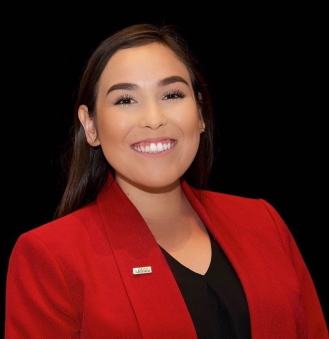My name is Cristal and I am a former foster youth from Bakersfield, California. I spent about 11 years in the Kern County, California, foster care system. I lived in many homes (26 foster homes and one group home), attended many schools (11 in fifth grade alone) and had many social workers.
But I had the same attorney for most of my time in care — for which I am grateful. I remember being nervous every time I went to court when I was younger, and those nerves got stronger as I got older.
The one good thing about those court visits is that each time before we saw the judge, I stepped into a room with my attorney where he took the time to assure me that I was going to be OK, see how I was doing and ask me for my opinion. I told him I really loved school, and he encouraged me to continue doing well and never shot down my dreams.
I knew I wanted to go to San Diego State University (SDSU) since the summer before sixth grade — and I told my attorney that. He didn’t tell me about the statistics or try to discourage this goal; instead, he was all for it. He told me how smart he thought I was — and I believed him! From then on, no matter how many times I moved, school remained something I felt I had control over — and that I could do well.
I think it’s important to watch what you say to any youth, especially when you are working with foster youth. I came across many social workers when I was younger who reminded me of the statistics and how “impossible” it was to go after what I wanted. They told me that I should lower my expectations because it is harder for foster youth.
I agree that it is more challenging for foster youth to make it and that foster youth have to jump through so many more hoops compared to non-foster youth to succeed, but that isn’t a reason for foster youth to think they can’t or shouldn’t pursue their dreams. Having social workers who thought I couldn’t make it made me want to prove them wrong.
Help exists in California
Having an attorney and other people simply tell me I could do whatever I set my mind to not only made me want to go further but gave me the encouragement I needed to believe in myself. It was my senior year of high school, and I was beginning to apply to colleges and of course SDSU was one of the schools I applied to.
I had conversations with my Independent Living Program (ILP) worker who liked to constantly “reel me in” because I had high hopes of getting into SDSU and attending. She encouraged me to attend the community college in Bakersfield instead (even though there was a four-year university in Bakersfield that I could have attended at the very least). She talked to me about how expensive going to college was, but failed to mention how much financial support is available for foster youth. She ended the meeting saying that I needed to apply to schools in Bakersfield “just in case” and that we would revisit this topic once I heard back from the other schools I applied to.
I didn’t want to stay in Bakersfield, and I left that meeting feeling like that was supposed to be my only option. I felt pretty annoyed and a little defeated, but that went away when I started getting my acceptance letters from schools outside Bakersfield. Then the most important acceptance letter came from SDSU; I got in! I had made it that far and was contacted by the Guardian Scholars program at SDSU.
Guardian Scholars is a program that offers not only financial, but emotional and social support to former foster youth throughout the duration of their time at SDSU. Everything was falling into place. Except my ILP worker still didn’t think it was a good idea and told me, very bluntly, that I would still not be able to attend school there because I was 17 and would be until November of that year. She told me I was not allowed to leave the county until I was 18 because I was a ward of the court.
What?! I had worked so hard. Again, I left defeated and feeling confused, but I let her know, point blank, that I would find a way. I was stubborn in her eyes, but I’d like to think that I was just determined. Although I had had great interactions with my attorney, outside of court visits I didn’t really get to talk to him — and I didn’t know that I could.
Words matter
I wish I would have known sooner that all it would take was talking to him and things would get fixed. That would have saved me a lot of worry and would have made my last couple of months of high school a lot less stressful. But the good news is that I did talk to my attorney. I had a plan and I knew exactly what I needed to do to get started at SDSU.
I’m honestly not entirely sure what had to be done for me to get emancipated, but I know that my attorney made it happen and very quickly. I didn’t get in contact with him until a couple of weeks before I was supposed to head out to San Diego; but one week before I left, I could finally breathe because I knew that I was going.
Not only did I finish with a bachelor’s degree from San Diego State University in 2018, I also just finished up a master’s degree in multicultural counseling. I wish I could let my attorney know how much him telling me I was smart and capable of reaching my dreams stuck with me. What I think is important for attorneys and anyone who works with foster youth to know when they interact with them is that words can go a long way.
Foster youth don’t need to be reminded of all the statistics that are stacked against them — they know. Foster youth don’t need to be told it is impossible for them to succeed, because it is not. Foster youth don’t need to feel that they shouldn’t dream big, because they should. Foster youth need to be encouraged and told that they can do it, because they can.
Foster youth need to be validated because life can be and is harder to navigate when you have to go through systems that aren’t exactly set up for you to “make it,” and they have every reason to be angry about that. Foster youth need to be told that you believe in them and that they are beautiful and smart because more often than not, they’re not coming from homes where they hear those things very often.
An attorney’s job is to make sure that the best decisions are being made for foster youth, but there is so much more that can be done that doesn’t involve laws, policies or paperwork. As an attorney, it is so important to treat every interaction with foster youth as a great opportunity to shed some light onto their life through care and advocacy. As an attorney you should recognize the positive impact you have the potential to make.
Cristal Ramirez, MS, is the youth coordinator for the National Association of Counsel for Children. She is a person with lived experience in the foster care system and is passionate about advocating for better policies and best practices for youth and families.
This column was originally written for the National Association of Counsel for Children.
Opinion piece by Cristal Ramirez for Youth Today | Cristal Ramirez

